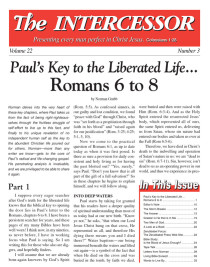
Tape Talk
Tape Talk
by Irene Gilsenan
CD REVIEW: Abraham
by Norman Grubb
In this series of 3 CDs, Norman tracks the stages of Abrahams life. En route, he emphasizes Abrahams lessons in faith, which culminated in what is described by Norman as perfect faith. Since Abraham is the father of the faith, Norman encourages us to learn from Dad, and these CDs are a great way to do just that. As with all of Normans teaching, examples of biblical situations are used to parallel what God desires to do through us today.
We learn that from when God first appeared to Abraham to tell him to move from Ur to Canaan, Abraham was inwardly fixed in knowing that he was to be Gods agent for human blessing. Throughout these CDs, Norman stresses that we are inner people and that what we know inside is what counts. He also takes the opportunity to point out that Gods call to Abraham was that through him shall all the families of the earth be blessed. Gods desire is for the total blessing of His peopleunlike the commonly held but false view that the God of the Old Testament is a God of wrath and punishment. Gods plan is for all of us to be channels whereby hungry people all over the world will be blessed. We all have the same commission as Abrahamto be rivers of living water.
Before God can operate by us, He has to operate in us. In order to get us into true focus, we have to be divorced from material alliances and their effects on us. That way we become free people, living in material conditions but with the Spirit coming through us. We are shown how this worked out practically in Abrahams life.
One of Abrahams first challenges in Canaan was the famine in the land. Without consulting God, Abraham moved to Egypt. Yet Norman leaves no scope for us to be self-righteously critical of this great man of God. This was a stage in Abraham recognizing that he could depend on God for all His physical needs.
We see how Abraham became more and more fixed in being Gods person. When some rivalry sprang up between Lot and Abraham, Abraham let Lot choose what land he wanted. Norman points out that Abraham was meek on what didnt matter and strong on what did, whereas Lot, who was also Gods man, had mixed motives, wanting God and the best land, flocks etc. We are challenged to face the fact that many of us remain in that place. Norman tells us that this life is not God and its God only.
We are given many further examples of Abrahams growing faith as he moved to a place of trusting God perfectly. When Lot was in danger, Abraham, who was a peaceful farmer and not a military man, went to his defense. Later, his meeting with Melchizedek symbolized his eternal priesthood. Yet, we also see Abrahams vulnerable human side as he experienced loneliness at having no heir. When Gods word came to him that his own son would be his heir, he believed God against every human appearance.
Norman takes this opportunity to draw many faith lessons from Abrahams life. We are told how all situations start by their impact on our human reasona fact which restricts us to operating by appearances. Clearly Abraham moved beyond this time after timebeginning with his move to an unknown land and culminating in his willingness to sacrifice Isaac, the child of the promise. We are told that he saw this as Gods calling and trusted that God would provide a sacrifice in place of Isaac although he had no earthly grounds to believe that. Norman warns us how easily a work of God can become a work without God. What starts as a God thing can become just a thing. Not so with Abraham. As he bound Isaac and lifted the knife he saw that it wasnt a question of the body of Isaac but of the living God through him. He was not willing to let human reason disrupt his trust in God to fulfill His promise. This was perfect faith in action.
Another example of someone not being restricted by appearances that is recalled is Jesus as He fed a crowd with 5 loaves, calmed a storm, walked on water and called death sleep. We are told that this other quality of lifewhat we call supernatural is really a whole other dimension of true laws. Norman challenges us to a new adventure of discovering how, when things confront us, we can transcend appearances by spirit action.
Norman relates some personal experiences of faith living from his own missionary days. He tells us that God gives each of us a faith commissionbut we have to be within hearing distance. This commission starts with something specific that can be added to as the years go on. We may well start with, It cant be but faith replies, God has said itit will happen. As you choose not to be controlled by appearances you have no idea how God may use you as a channel to feed those hungry people He so cares about. The question isare you within hearing distance?
For some insightful and challenging views on the father of our faith these CDs are a must. Why not take Norman at his word and learn from Dad?





